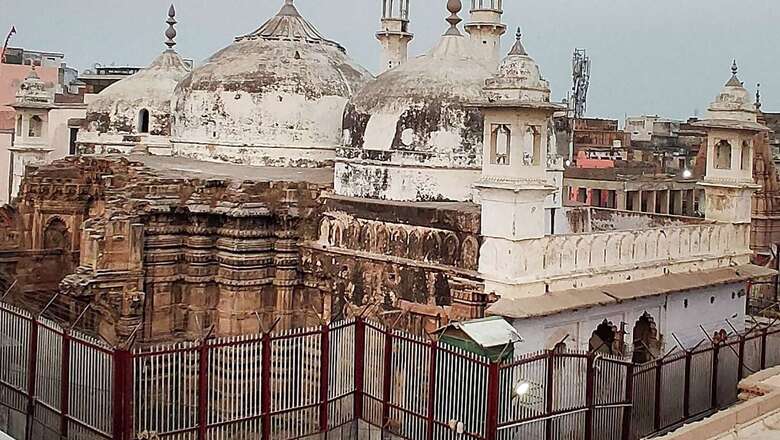
views
After hearing arguments of both sides in the Gyanvapi mosque case, the Varanasi court adjourned the hearing, and said it will decide on the next hearing date on Tuesday. In an environment of ‘secrecy’, the court proceedings lasted for about 40 minutes. While the Hindu side has sought scrapping of the Places of Worship 1991 Act, Muslim lawyers argued for the case to be quashed.
Days after the Supreme Court had transferred the Gyanvapi mosque case from civil judge (senior division) to district judge, the Varanasi court began hearing the civil suit filed by Delhi-based Hindu women on Monday afternoon.
Meanwhile, ‘secrecy’ was said to be maintained during the case hearing as only 23 people, including 19 counsels and four petitioners, were allowed inside the courtroom, police said. Former advocate commissioner Ajay Mishra, who was sacked from the survey team earlier, was also not allowed inside the court.
The Supreme Court had on Friday said that looking at the complexities and sensitivity of the issue, it is better for a senior judicial officer to handle the case. It also clarified that it is not casting any aspersion on the civil judge (senior division) who was earlier dealing with the suit.
The top court was hearing a plea by Anjuman Intezamia Masajid Committee, against an order by a Varanasi court for a videographic survey of the Gyanvapi Mosque complex adjacent to the famous Kashi Vishwanath Temple in Varanasi.
The SC, however, said the interim order dated May 17 directing protection of the “shivling” area and allowing Muslims to offer namaz in the premises shall remain in operation till the maintainability of the suit is decided.
Hearing arguments from the Muslim side, the apex court said this was a “complex social problem” and a solution by a human cannot be perfect. “Our order is to maintain a certain degree of peace and calm, and our interim orders calm some frayed nerves with a healing touch. We’re on a joint mission for preserving a sense of unification in the country,” the SC said.
The civil court is hearing a suit by a group of women seeking permission for daily worship of Hindu deities whose idols are located on an outer wall of the mosque. The mosque management committee had opposed filming inside the mosque and also accused the court-appointed commissioner of partiality. Amid the opposition, the survey was stalled for a while.
The videographic survey of the mosque was ordered on April 18, 2021, by the civil judge (senior division) Varanasi following the plea by Delhi residents Rakhi Singh, Laxmi Devi, Sita Sahu, and others. The original suit was filed in 1991 in the Varanasi district court for the restoration of the ancient temple at the site where the Gyanvapi mosque currently stands.
Hindu devotees refer British era govt stand taken in 1936 suit
Hindu women plaintiffs have referred to stand taken by the British government in a 1936 suit seeking it to be declared as Waqf property. In an affidavit filed through advocate Vishnu Shankar Jain, three of the five women devotees said that in 1936 one Deen Mohammed has filed a civil suit without impleading any member of the Hindu community but impleading only the Secretary of State for India through District Magistrate, Benares and Anjuman Intajamia Masajid, Benares for granting declaration that the land bearing situated in the city measuring (1 Bigha 9 Biswa and 6 Dhurs) together with enclosure all-around described in the plaint was Waqf in possession of that plaintiff (Mohammed).
The affidavit has been filed in response to the plea of the Committee of Management Anjuman Intezamia Masjid which manages Gyanvapi mosque in Varanasi seeking quashing of the recent survey of the mosque.
The affidavit said that the 1936 suit said that Muslims had the right to say their prayers especially Alvida’ prayers and to exercise other religious and legal rights as the need and occasion arise.
It is submitted that the Muslims had filed the above-mentioned suit only for declaration without seeking any consequential relief. This suit was filed even without impleading any person from the Hindu community. Therefore, the judgement passed in the suit is not binding upon any member of Hindu community but any document, map, evidence or statement of any witness can be referred to or relied upon by the members of Hindu community, the affidavit said.
It referred to a written statement filed in the Civil Suit on behalf of the Secretary of State for India in Council refuting the plaint allegations and it was stated that the idols and the temple which stand there exist since long before the advent of the Mohammedan Rule in India”.
Read all the Latest India News here













Comments
0 comment